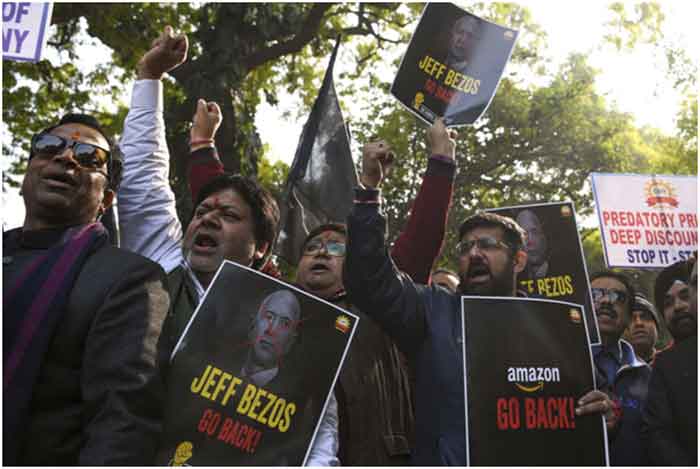
Amazon is in conflict with Indian retailers.
A leading group of Indian retailers on Wednesday urged the government to ban the local operations of Amazon.com Inc, after Reuters reported the U.S. e-commerce giant has for years given preferential treatment to a small group of sellers on its India platform and used them to circumvent the country’s strict foreign investment regulations.
Based on internal Amazon documents dated between 2012 and 2019, the Reuters report https://www.reuters.com/investigates/special-report/amazon-india-operation, provided an inside look at the cat-and-mouse game Amazon has played with India’s government, adjusting its corporate structures each time the government imposed new restrictions aimed at protecting small traders.
In a statement, the Confederation of All India Traders (CAIT), which says it represents 80 million retail stores and 40,000 trade associations in India, said “the shocking revelations” in the Reuters story are “sufficient enough to immediately ban operations of Amazon in India.”
The group called on Commerce Minister Piyush Goyal to take immediate note of this “important and burning issue and order for a ban on operations of Amazon in India.”
Amazon did not respond to a request for comment on the trader group’s statement. But shortly after CAIT issued its call for the ban, Amazon retweeted the Reuters report, criticizing it as “unsubstantiated, incomplete, factually incorrect,” without going into specifics. It added, “Amazon remains compliant with Indian laws.”
“In last several years, there have been (a) number of changes in regulations; Amazon has on each occasion taken rapid action to ensure compliance. The story therefore seems to have outdated information and doesn’t show any non-compliance,” Amazon said on its Amazon India News Twitter account.
A spokesperson for India’s Ministry of Commerce and Industry did not respond when contacted outside regular business hours.
The Amazon documents revealed the e-commerce company helped a small number of sellers in India prosper, gave them discounts on fees, and helped one cut special deals with big tech manufacturers such as Apple Inc. The company exercised significant control over the inventory of some of the biggest sellers on Amazon.in, the documents showed. Government rules announced in 2016 required that an e-commerce platform should “not exercise ownership” over sellers’ inventory. Amazon pledges that all sellers operate independently on its platform.
Amazon has been facing increasing scrutiny by Indian regulators, and the detailed look inside its strategy could deepen the risks for the company in one of its key growth markets. Indian retailers, who are a crucial part of Prime Minister Narendra Modi’s support base, have long alleged that Amazon’s platform largely benefits a few big sellers and that the e-commerce company engages in predatory pricing that harms their businesses.
In a written response to the Reuters story, which was published on Wednesday, Amazon said it “does not give preferential treatment to any seller on its marketplace,” and that it “treats all sellers in a fair, transparent, and non-discriminatory manner, with each seller responsible for independently determining prices and managing their inventory.”
The Indian retailer group on Wednesday said the Reuters report “vindicates the stand and arguments” it made in recent years. “The CAIT will raise this issue in a bigger way,” the group said.
CAIT on Wednesday “demanded” serious action from the Indian government against Amazon. “For years, CAIT has been maintaining that Amazon has been circumventing FDI [Foreign Direct Investment] laws of India to conduct unfair and unethical trade,” it said.
Praveen Khandelwal, Secretary General of CAIT, said, “It’s an open and shut case that Amazon is willfully playing with rules. What more we are waiting for? It should be banned in India with immediate effect.”
CAIT has for years expressed concerns over what they allege are unlawful business practices employed by Amazon and Walmart-owned Flipkart in the country. They say these actions are posing existential threats to small merchants.
India is a key overseas market for Amazon, which has committed to invest over $6.5 billion in its operations in the world’s second largest internet market.
Long-standing laws in India have constrained Amazon and other e-commerce firms to not hold inventory or sell items directly to consumers. To bypass this, the company has operated through a maze of joint ventures with local companies that operate as inventory-holding firms. India got around to fixing this loophole in late 2018.
Citing private company documents, Reuters said that Amazon had exercised significant control over the inventory of some of the biggest sellers. The report claimed that 33 Amazon sellers accounted for about a third of the value of all goods sold on Amazon, and two sellers in which Amazon had an indirect stake accounted for around 35% of the platform’s sales revenue in early 2019.
The new report and its potential repercussions is just the latest headache for Amazon in India.
Amazon deployed secret strategy to dodge India’s regulators, documents show
The Reuters exclusive report said:
Amazon has for years given preferential treatment to a small group of sellers on its India platform, publicly misrepresented its ties with the sellers and used them to circumvent increasingly tough foreign investment rules that affect e-commerce, internal company documents reviewed by Reuters show.
The documents, dated between 2012 and 2019, are reported here for the first time. They provide an inside look at the cat-and-mouse game Amazon has played with India’s government, adjusting its corporate structures each time the government imposed new restrictions aimed at protecting small traders.
Following a few of the key findings from the Reuters’ special report:
- The documents reveal that the American e-commerce giant helped a small number of sellers prosper and gave them discounted fees, using them to bypass India’s regulatory restrictions on foreign investment aimed at protecting small traders.
- Some 33 Amazon sellers accounted for about a third of the value of all goods sold on the company’s website in early 2019, the documents show. Another two big sellers – merchants in which Amazon had indirect equity stakes – accounted for around 35% of the platform’s sales revenue in early 2019. That meant some 35 of Amazon’s more than 400,000 sellers in India at the time accounted for around two-thirds of its online sales.
- Amazon exercised significant control over the inventory of some of the biggest sellers on Amazon.in, the documents show, even though it says publicly that all sellers operate independently on its platform.
- Amazon helped Cloudtail, a seller in which it has an indirect equity stake, cut special deals with big tech manufacturers such as Apple Inc, the documents show.
- One document contains a frank appraisal of Modi. “PM Modi is not an intellectual or an academic but believes that strong administration and governance is the key to running a successful government,” it said.
Amazon says it now has over 700,000 sellers on its platform. During a visit to India in January last year, Amazon founder Jeff Bezos announced that the company would spend $1 billion to bring small businesses online in the country. That would take Amazon’s total committed India investment to $6.5 billion.
Amazon had close to $10 billion in India sales in 2019, according to Forrester Research.
Amazon’s announcement for investment underscored how far India had come to open up to foreign firms. The nation, which had largely kept doors shut to international giants between its independence in 1947 to liberalization in 1991, has slowly transformed itself into the world’s largest open market.
In a televised interview in 2014, Bezos said that there was a perception about India not being an easy place to do business. But Amazon’s growth in the country, he said, was proof that this belief is not accurate.
“Are there obstacles? There are always obstacles. Anywhere you go, every country has its own regulations and rules,” he said.
Six years, Amazon today appears to be facing more obstacles than ever in India, the second-largest internet market with more than 600 million users.
GET COUNTERCURRENTS DAILY NEWSLETTER STRAIGHT TO YOUR INBOX















































